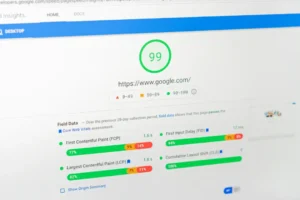
Introduction to AI in Digital Marketing
Artificial intelligence (AI) has emerged as a transformative force within the realm of digital marketing, reshaping traditional strategies and ushering in innovative approaches to customer engagement and data analysis. In recent years, the infusion of advanced algorithms and machine learning techniques has redefined how businesses understand and connect with their audiences. It’s essential to recognize that AI is not just a technological novelty; it is a fundamental component that enhances the effectiveness of digital marketing campaigns.
The significance of AI in today’s marketing landscape cannot be overstated. By automating various processes, AI allows for the optimization of resource allocation, leading to better-targeted and more efficient marketing strategies. AI-driven tools analyze vast datasets, enabling marketers to glean insights into consumer behavior and preferences. This capability leads to more personalized and relevant content, fostering stronger relationships between brands and their customers.
Moreover, the integration of AI into digital marketing facilitates predictive analytics, allowing businesses to anticipate market trends and consumer needs. By harnessing these predictive capabilities, companies can tailor their offerings and communications, ultimately improving customer satisfaction and driving conversions. The adaptability of AI applications ensures that they can evolve alongside changing consumer dynamics, making them invaluable assets in an ever-competitive digital landscape.
As we delve deeper into the innovative applications of artificial intelligence, it is crucial to grasp how these advancements can be leveraged to create impactful marketing strategies. Understanding the foundational role of AI will provide context for the specific techniques and solutions that have emerged, allowing businesses to enhance their digital marketing efforts comprehensively.
Understanding Recommendation Systems
Recommendation systems represent a critical intersection of digital marketing and artificial intelligence applications. These sophisticated algorithms analyze user data to predict preferences and suggest relevant products or services, leading to increased engagement and potential sales. By leveraging extensive data on user behavior, such as browsing history, purchase patterns, and demographic information, businesses can tailor their offerings to meet individual consumer needs.
One of the primary functions of recommendation systems is personalization. Essentially, these systems curate content tailored to the unique interests of users. For instance, streaming services like Netflix utilize AI-driven recommendation engines to suggest movies and shows based on a viewer’s past watch history. Similarly, e-commerce giants like Amazon deploy these systems to recommend products that align with previous purchases or items users have viewed. These personalized suggestions not only enhance user experience but significantly improve conversion rates, exemplifying the effectiveness of digital marketing strategies that harness artificial intelligence.
Moreover, the intelligence embedded within these recommendation systems evolves with user interaction. As consumers engage with the platform, the algorithms continuously refine their predictions and recommendations. This feedback loop creates a dynamic wherein the digital marketing landscape becomes increasingly attuned to consumer behavior, leading to a more compelling shopping experience. Major brands recognize the value of utilizing recommendation systems as a means to boost customer loyalty and retention. Through providing relevant and personalized suggestions, businesses can foster stronger relationships with their customers, ultimately impacting their bottom line positively.
Incorporating AI-powered recommendation systems into digital marketing strategies is no longer an optional enhancement; it is a vital necessity that effectively aligns with consumer expectations and behaviors. These advances not only improve the efficiency of marketing campaigns but also position brands advantageously in an increasingly competitive marketplace.
The Role of Chatbots in Customer Engagement
In the rapidly evolving landscape of digital marketing, artificial intelligence applications have emerged as transformative tools, particularly in the realm of customer engagement. A significant advancement in this area is the development of AI-driven chatbots. These virtual assistants are designed to provide immediate, accurate support and assistance to customers, effectively enhancing the overall experience. The integration of chatbots into customer service strategies has proven to be beneficial for businesses seeking to stay competitive in a digital-first world.
Chatbots operate by leveraging complex algorithms and machine learning techniques to understand and respond to customer inquiries. They can handle a wide array of tasks, ranging from answering commonly asked questions to assisting with product selections and processing orders. This capability not only streamlines operations but also ensures that customer inquiries are addressed without delay, which is a critical factor in maintaining customer satisfaction. The ability of these digital assistants to operate 24/7 further reinforces their role in providing exceptional service and engagement.
Moreover, various platforms have successfully adopted chatbots to enhance their customer service offerings. For instance, businesses utilizing social media applications can deploy chatbots to interact with users directly within messaging platforms, thereby facilitating seamless communication. E-commerce websites have also integrated chatbots into their user interfaces, enabling customers to receive real-time assistance while browsing products. These implementations showcase how artificial intelligence applications can be tailored to meet the distinct needs of different sectors, ultimately driving engagement and fostering customer loyalty.
In conclusion, the use of AI-driven chatbots represents a significant advancement in digital marketing strategies, particularly for improving customer service. Their capability for real-time interaction and adaptability across various platforms makes them invaluable in enhancing customer engagement while supporting businesses in achieving their marketing goals.
Automated Ad Placement and Optimization
The rise of artificial intelligence applications in digital marketing has fundamentally transformed how businesses approach advertising. One of the most significant advancements relates to automated ad placement and optimization, where sophisticated algorithms analyze vast amounts of data to deliver targeted advertisements more effectively. By employing machine learning, these AI systems can identify optimal times and platforms for ad placements, ensuring that marketing efforts reach the right audience at the most opportune moments.
Through continuous learning from user interaction patterns, AI tools can predict and adapt to changing consumer behaviors with remarkable accuracy. When it comes to social media advertising, for instance, AI algorithms assess user activity, engagement rates, and even demographic information to automate placements. This ensures that ads are not only seen but also resonate with the audience, increasing the likelihood of engagement and conversions. The efficiency of these applications allows marketers to allocate their budgets more strategically, leading to a significant boost in return on investment (ROI).
Additionally, automated optimization plays a pivotal role in enhancing campaign performance. By continuously monitoring ad performance metrics, such as click-through rates and conversions, AI can make real-time adjustments to ad copy, visuals, targeting criteria, and bidding strategies. This dynamic approach minimizes the need for human intervention, allowing marketers to focus on creative and strategic elements while the AI handles the technical aspects.
The integration of artificial intelligence in digital marketing strategies not only streamlines campaign management but also provides insights that were previously unattainable. By harnessing the power of data analysis, businesses can leverage AI-driven solutions to personalize user experiences and optimize their advertising efforts, ultimately revolutionizing their approaches to digital marketing.
Enhancing Marketing Efficiency with AI
In the rapidly evolving landscape of digital marketing, artificial intelligence applications are increasingly recognized for their ability to enhance marketing efficiency. The integration of AI technology into marketing workflows not only streamlines processes but also significantly reduces the burden of manual tasks, allowing marketers to allocate their resources to more strategic endeavors. This shift toward automation is a vital development in enhancing productivity and effectiveness across marketing teams.
One of the most impactful ways in which artificial intelligence applications contribute to marketing efficiency is through the automation of repetitive tasks. For instance, AI-powered tools can manage data entry, customer segmentation, and performance analytics, often completing these processes faster and with greater accuracy than human operators. By relieving team members of these mundane duties, businesses enable their personnel to concentrate on creative and analytical tasks that require human intuition, ultimately leading to more impactful marketing strategies.
Moreover, AI systems are capable of analyzing vast amounts of data in real-time, offering insights that can drive more effective marketing campaigns. These insights may include identifying trends, predicting consumer behavior, and personalizing content, which are essential for targeting the right audience with the right message. As marketers turn to data-driven strategies, such capabilities help in optimizing marketing efforts, thus enhancing engagement and conversion rates.
Furthermore, the implementation of artificial intelligence applications leads to improved forecasting and decision-making processes. Through advanced predictive analytics, marketers can better anticipate market shifts and consumer needs, which informs the allocation of resources and budgetary decisions. By leveraging AI in this manner, businesses can achieve higher operational efficiency and responsiveness to market dynamics.
Overall, the integration of artificial intelligence into digital marketing processes heralds a new era of enhanced productivity and efficiency, equipping marketers with tools that allow them to focus on high-value tasks and strategic objectives.
Personalization at Scale: How AI Makes It Possible
The rapid advancements in artificial intelligence applications have transformed the landscape of digital marketing, particularly in the realm of personalized content delivery. Brands are increasingly leveraging AI technologies to provide tailored marketing experiences that resonate with individual consumers at an unprecedented scale. By utilizing sophisticated algorithms and data analysis techniques, marketers can segment users based on their behaviors and preferences, allowing for highly targeted campaigns that enhance engagement and conversion rates.
One of the most significant advantages of AI in digital marketing is its ability to analyze vast datasets in real time, which offers insights into consumer actions and trends. Machine learning, a subset of AI, enables marketers to predict future behavior by examining past interactions. For instance, through predictive analytics, brands can identify products a customer is likely to be interested in, thus tailoring recommendations that are specifically relevant to that individual. Such customization not only helps in improving customer satisfaction but also encourages brand loyalty by making consumers feel valued and understood.
Moreover, AI empowers brands to deliver timely messages through automated systems, enhancing the efficiency of email marketing and social media campaigns. Automated tools can trigger messages based on specific user actions, such as abandoning a shopping cart or browsing particular categories, thereby increasing the likelihood of conversion. This level of personalization, driven by artificial intelligence applications, enables brands to engage with their audience meaningfully, creating a sense of relevance that is often lacking in traditional marketing strategies.
As digital marketing continues to evolve, the integration of AI will likely become even more critical. The ongoing development of intelligent algorithms promises to refine how brands interact with their customers, ensuring that personalization is not only effective but also scalable.
Challenges and Limitations of AI in Marketing
While artificial intelligence applications offer numerous benefits to digital marketing, they are not without their challenges and limitations. One of the most pressing issues is data privacy. As businesses increasingly leverage AI to analyze vast quantities of consumer data, concerns regarding the ethical use of this information have grown. Regulatory frameworks, such as the General Data Protection Regulation (GDPR) in Europe, impose strict guidelines on data handling, creating compliance challenges for organizations utilizing AI technology in their marketing strategies. Failure to adhere to these regulations can lead to significant fines and damage to brand reputation.
Another critical challenge is algorithm bias, which can arise from the data used to train AI models. If the datasets are not representative or are skewed in any way, the resulting AI applications may produce biased outcomes. This can have serious implications for marketing campaigns, as biased algorithms can lead to the marginalization of certain consumer groups or reinforce existing stereotypes, potentially alienating a portion of the target audience. Marketers must be vigilant in monitoring their AI systems to ensure fairness and inclusivity in digital marketing efforts.
Furthermore, while artificial intelligence applications can enhance efficiency and streamline processes, they may lack the human touch that is crucial in building genuine customer relationships. Automated interactions, such as chatbots and personalized emails, can sometimes come across as impersonal or robotic, potentially leading to a disconnect with consumers. The ability to empathize and understand nuanced feelings and emotions is something that AI has yet to master fully. As a result, businesses must strike a delicate balance between automation and the need for authentic human engagement in their marketing efforts. Successfully navigating these challenges is essential for optimizing digital marketing initiatives through AI.
Future Trends of AI in Digital Marketing
As we venture deeper into the realm of digital marketing, the influence of artificial intelligence applications continues to expand, promising to revolutionize how businesses engage with their audience. One of the most significant advancements witnessed in recent years is the proliferation of machine learning algorithms. These algorithms are increasingly adept at analyzing vast amounts of consumer data to identify patterns and preferences. This enables marketers to create personalized campaigns that resonate more effectively with their target demographics, enhancing overall engagement and conversion rates.
Predictive analytics represents another vital aspect of the future of digital marketing. By employing AI-driven predictive models, businesses can forecast customer behavior and trends with increased accuracy. This empowerment allows marketers to proactively tailor their strategies, aligning product offerings with anticipated consumer interests. For instance, predictive analytics can assist in inventory management, ensuring that businesses stock items in demand, thereby optimizing their resources and maximizing sales potential.
Furthermore, augmented reality (AR) applications are set to change the landscape of digital marketing dramatically. AI-powered AR experiences can offer immersive interactions, allowing consumers to visualize products in their own environments before making a purchase. This technology not only enhances customer engagement but also reduces return rates, as customers can make more informed buying decisions. By integrating AR into digital marketing strategies, businesses stand to gain a competitive edge, creating memorable experiences that foster brand loyalty.
Moreover, the increasing importance of voice and visual search optimization signifies a shift in consumer behavior. As more individuals utilize voice-activated devices and visual search tools, digital marketing approaches must evolve accordingly. AI will play a crucial role in optimizing content for these technologies, ensuring brands remain visible and relevant in a rapidly transforming marketplace. In conclusion, the forward momentum of artificial intelligence applications in digital marketing is set to reshape the industry, offering exciting opportunities for innovation and growth.
Conclusion: Embracing AI for Marketing Success
In recent years, the integration of artificial intelligence applications into digital marketing has profoundly transformed the landscape of marketing strategies. As discussed in this blog post, AI technologies enable marketers to enhance their campaigns through data-driven insights and improved audience targeting. From predictive analytics to chatbots, the various artificial intelligence applications contribute to more efficient customer interactions and personalized marketing experiences.
One significant advantage of adopting AI in digital marketing is the ability to analyze vast amounts of data quickly. This capability allows marketers to refine their strategies, anticipate customer needs, and deliver content that resonates with their target audience. Furthermore, machine learning algorithms can continuously evolve based on user behavior, ensuring that marketing efforts remain relevant and effective over time.
Another crucial aspect is the enhancement of customer experiences through automation. AI-driven tools, such as personalized recommendations and automated email marketing, streamline communication and improve engagement. By automating repetitive tasks, marketers can focus their energies on creativity and strategy, optimizing their overall operations.
However, the implementation of artificial intelligence in digital marketing is not without challenges. Marketers must navigate ethical considerations surrounding data privacy and ensure compliance with regulations. Additionally, there may be a learning curve for organizations unfamiliar with AI technologies. Therefore, it is essential for digital marketers to stay informed about the latest advancements and continuously adapt their strategies to leverage the full potential of AI.
Ultimately, embracing AI in digital marketing is no longer an option but a necessity for achieving marketing success. Organizations that invest in these innovative technologies will be better positioned to meet evolving consumer demands, optimize performance, and maintain a competitive edge in the ever-changing market landscape. As we look to the future, adapting to technological advancements will be key to driving growth and achieving sustainable success in the digital realm.









